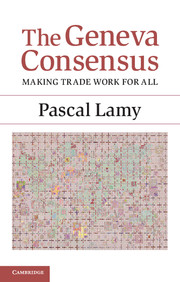Book contents
- Frontmatter
- Contents
- Preface
- 1 Harnessing globalization amid the crisis facing multilateralism
- 2 The changing face of trade
- 3 Helping the poorest up the prosperity ladder
- 4 Trade: friend not foe of the environment
- 5 Trading towards global food security
- 6 Trade can contribute towards better health
- 7 Trade and labour: separated at birth, but still connected
- 8 Trade and energy: the case for a greater WTO role
- 9 Trade and currencies: trading community seeks greater currency stability
- 10 Trade and competition: fairer competition makes for fairer trade
- 11 Trade and human rights: a case of misplaced suspicion
- 12 Corruption: a cancer that trade transparency can help to treat
- 13 Last but not least: the Doha Round
- Epilogue
- Index
9 - Trade and currencies: trading community seeks greater currency stability
Published online by Cambridge University Press: 18 December 2013
- Frontmatter
- Contents
- Preface
- 1 Harnessing globalization amid the crisis facing multilateralism
- 2 The changing face of trade
- 3 Helping the poorest up the prosperity ladder
- 4 Trade: friend not foe of the environment
- 5 Trading towards global food security
- 6 Trade can contribute towards better health
- 7 Trade and labour: separated at birth, but still connected
- 8 Trade and energy: the case for a greater WTO role
- 9 Trade and currencies: trading community seeks greater currency stability
- 10 Trade and competition: fairer competition makes for fairer trade
- 11 Trade and human rights: a case of misplaced suspicion
- 12 Corruption: a cancer that trade transparency can help to treat
- 13 Last but not least: the Doha Round
- Epilogue
- Index
Summary
Exchange rates are, and have always been, a highly sensitive subject in the WTO. There is an emotional, cultural – if not moral – dimension attached to them by the trade community in which the line between reality and perception can become blurred. This is in part because the WTO community has a limited grasp of the workings of the financial system and of the macroeconomic developments that determine exchange rates, such as domestic interest rates and the competitiveness of domestic industry. It is also because, as exchange rates are exogenous to the trade community, some may feel that they are systematically on the receiving end of unwarranted fluctuations. At the start of the financial crisis, in September 2010, the Brazilian Finance Minister, Guido Mantega, cried murder: exchange rate fluctuations were leading to currency wars.
The liberalization of capital flows in the last two decades and the enormous increase in the scale of cross-border financial transactions have increased exchange rate movements. The uncertainty associated with some erratic movements can be not only a source of frustration but also of asymmetric costs, which can distort international competition. Think about the abruptness of local financial crises and how short-term capital flights may spill over into brutal adjustment of exchange rates – a phenomenon observed during the Asian financial crisis of the late 1990s. For small or medium-sized economies, these are enormous shocks to absorb.
- Type
- Chapter
- Information
- The Geneva ConsensusMaking Trade Work for All, pp. 122 - 130Publisher: Cambridge University PressPrint publication year: 2013

